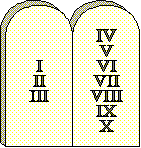Darkness to Light
Home Page
Books and eBooks by the Director
Mormonism:
Just Another Christian
Denomination?
Part
Two
By
Gary F. Zeolla
Mormonism: Just Another Christian
Denomination? - Part One discussed Mormon teachings in
regards to the Bible, the nature of God and our relationship to
Him, the doctrine of the Trinity, and the Person of Jesus Christ.
This second half of this article will continue this discussion by
looking at Mormon teachings on the work of Jesus, the afterlife,
and salvation.
The
Work of Jesus Christ
What does the Mormon church teach about the atonement of Jesus
Christ? To answer this question requires first a look at the
Mormon concept of death.
The Mormon book Gospel Principles explains, "The
fall of Adam brought about two kinds of death into the
world—physical death and spiritual death. Physical death is
separation of the body from the spirit. Spiritual death is
separation from the Lord."1
Most Christians would agree with this idea of there being two
different kinds of death (see James 2:26 for physical and Gen
2:17; 3:6-9; 5:5 for spiritual death).
But what did Jesus do about these two kinds of death? As for
physical death, Principles says, "On the third day
after the resurrection, Christ took up his body again and became
the first person to be resurrected.... Christ thus overcame
physical death. Because of his atonement all persons born on this
earth will be resurrected."2
 John Taylor (third Mormon prophet) concurs, "If
it were not for the atonement of Jesus Christ, the sacrifice He
made, all the human family would have to lie in the grave
throughout eternity without hope."3 And further,
"The atonement made by Jesus Christ brought about the
resurrection from the dead and restored life."4
John Taylor (third Mormon prophet) concurs, "If
it were not for the atonement of Jesus Christ, the sacrifice He
made, all the human family would have to lie in the grave
throughout eternity without hope."3 And further,
"The atonement made by Jesus Christ brought about the
resurrection from the dead and restored life."4
So the atonement of Christ assures all people will overcome
physical death and be resurrected. But what about spiritual
death? What did Jesus do about it?
Principles explains:
Christ's atonement MAKES IT POSSIBLE for us to overcome
spiritual death. Although all mankind will be resurrected
with a body of flesh and bone, only those who accept Christ's
atonement will be saved from spiritual death. WE ACCEPT
CHRIST’S ATONEMENT BY REPENTING OF OUR SINS, BEING
BAPTIZED, RECEIVING THE GIFT OF THE HOLY SPIRIT, AND OBEYING
ALL OF THE COMMANDMENTS. In this way we are cleansed from sin
and we become WORTHY to RETURN and live with our Heavenly
Father.5
First, note the words, "RETURN and live with our Heavenly
Father." Return is used because of the Mormon idea of
pre-existence in heaven before life on earth as discussed in Part
One.
Second, Mormonism teaches that only its ordained elders can
properly baptize and impart the gift of the Holy Spirit. Joseph
F. Smith taught, "Baptism means immersion in water, and it
is to be administered BY ONE HAVING AUTHORITY, in the name of the
Father, and of the Son, and of the Holy Ghost. BAPTISM WITHOUT
DIVINE AUTHORITY IS NOT VALID."6
John Taylor stated, "He [God] has introduced in the first
principles of the gospel the means of their becoming possessed of
His Spirit THROUGH BAPTISM AND THE LAYING ON OF HANDS BY THOSE
HAVING AUTHORITY.…"7
And, of course, Mormons believe only they have the authority.
Heber J. Grant, seventh LDS prophet, said, "We claim ...
authority and declare to all the world that John the Baptist, who
held the keys of authority to baptize, restored the Aaronic
Priesthood and bestowed it upon Joseph Smith and Oliver
Cowdery."8
 Third, in
addition to repenting, being baptized and then receiving the Holy
Spirit, to be saved from spiritual death, one must obey "ALL
of the commandments." Joseph Smith declared, "To get
salvation we must not only do some things, but EVERYTHING which
God has commanded."9 So the Mormon church
obviously does NOT believe in salvation by grace alone.
Third, in
addition to repenting, being baptized and then receiving the Holy
Spirit, to be saved from spiritual death, one must obey "ALL
of the commandments." Joseph Smith declared, "To get
salvation we must not only do some things, but EVERYTHING which
God has commanded."9 So the Mormon church
obviously does NOT believe in salvation by grace alone.
Spencer W. Kimbell, twelfth LDS president, made this vividly
clear, "One of the most fallacious doctrines ORIGINATED BY
SATAN and propounded by man is that MAN IS SAVED ALONE BY THE
GRACE OF GOD; that belief in Jesus is all that is needed for
salvation."10 However, this is in fact what the
Bible teaches.
Paul wrote, "For by grace you have been saved through
faith, and that not of yourselves; it is the gift of God, not of
works, lest anyone should boast" (Eph 2:8,9). Further,
"And if by grace, then it is no longer of works; otherwise
grace is no longer grace. But if it is of works, it is no longer
grace; otherwise work is no longer work" (Rom 11:6). So the
salvation by grace AND works system of Mormonism is Biblically
and logically impossible.
As for baptism, in 1Corinthians 1:14-17, Paul separates the
Gospel from baptism. In fact, baptism is so much of a concern for
Paul, he cannot even remember whom he had baptized!
As for how one receives the Spirit, Jesus declared, "...
how much more will your heavenly Father give the Holy Spirit to
those who ASK Him!" (Luke 11:13). People do not need to have
hands laid on them to receive the Spirit; they just need to ask
God! In Acts 10:44-48, the Spirit fell upon the people without
Peter laying his hands on them and BEFORE they were baptized.
The
Intermediate State
What happens after death and before the general resurrection?
Historic Christianity believes "in the conscious existence
of all souls between death and resurrection, of the believer in
heaven with God, of the unbeliever in Hades apart from the
Lord" (article #10 of Darkness to Light's Confession of
Faith).
The Mormon belief is somewhat similar. After death, Joseph
Smith taught, "The righteous and the wicked all go to the
same world of spirits until the resurrection."11
However, this "spirit world" is divided into two
compartments. The righteous are in "a place called
paradise."12 The wicked are considered to be
"spirits in prison."13 So, in essence,
Mormonism has distinct places for the righteous and the wicked to
go upon death; the former to "paradise" and the latter
to "prison."
But this is where the similarity ends. For historic Christians
there "is a great gulf fixed" between the two places so
that souls cannot pass from one to the other (see Luke 16:26).
For Mormons, much traffic flows between the two.
Joseph F. Smith claims he had a vision in which:
I beheld that the FAITHFUL ELDERS of this dispensation, when
they departed from mortal life, CONTINUE THEIR LABORS in the
preaching of the gospel of repentance and redemption, through
the sacrifice of the Only Begotten Son of God, among those
who are in darkness and under the bondage of sin IN THE GREAT
WORLD OF THE SPIRITS OF THE DEAD.14
So Mormon missionaries are still active after death as Mormons
believe people will have a chance to accept their message in the
spirit world. But what is the "gospel" being proclaimed
to the departed?
Joseph F. Smith relates further on his vision:
Thus was the gospel preached to those who had died in their
sins, without a knowledge of the truth, or in transgression,
having rejected the prophets. These were taught faith in God,
repentance from sin, VICARIOUS BAPTISM for the remission of
sins, the gift of the Holy Ghost by the laying on of hands,
AND ALL OTHER PRINCIPLES OF THE GOSPEL THAT WERE NECESSARY TO
QUALIFY THEMSELVES that they might be judged according to men
in the flesh, but live according to God in the spirit.15
So the departed hear the same gospel of salvation by grace
plus works that Mormons proclaim here. The problems with this
system have already been demonstrated. Also, note the phrase
"vicarious baptism." What this refers to is discussed
next.
Baptism
for the Dead
Joseph F. Smith taught:
THE DEAD ARE NOT PERFECTED WITHOUT US, NEITHER ARE WE WITHOUT
THEM. We have a mission to perform for and in their behalf;
we have a certain work to do in order to liberate those who,
because of ignorance and the unfavorable circumstances in
which they were placed here, are unprepared for eternal life;
WE HAVE TO OPEN THE DOOR FOR THEM, by performing ordinances
which they cannot perform for themselves and which are
essential to their release from the "prison-house,"
to come forth and live according to God in the spirit and be
judged according to the flesh.16
Remember, in Mormonism, in order to be saved one must be
baptized. However, as Wilford Woodruff states, "They will
not baptize anybody in the spirit world; there is no baptism
there .... THE LORD HOLDS US RESPONSIBLE for going to and
building temples, that we may attend therein to the ordinances
necessary for the salvation of the dead."17
Joseph Smith took this even further, "Those Saints who
neglect it in behalf of their deceased relatives, do it AT THE
PERIL OF THEIR OWN SALVATION."18 So being
baptized for the dead is not optional for Mormons. The salvation
of their departed relatives and their own salvation depends on
it. But what is the Biblical basis for the practice?
Joseph Smith proclaimed, "The doctrine of baptism for the
dead IS CLEARLY SHOWN IN THE NEW TESTAMENT; and if the doctrine
is not good, then throw the New Testament away; but if it is the
word of God, then let it be acknowledged."19
Despite this claim, there is only ONE VERSE in the New
Testament that actually mentions baptism for the
dead—1Corinthians 15:29. The context of this verse is Paul's
discussion of the resurrection of the dead. More specifically,
Paul is contending with people who deny the concept of a bodily
resurrection of the dead.
The verse reads in the NKJV, "Otherwise, what will THEY
do who are baptized for the dead, if the dead do not rise at all?
Why are THEY baptized for the dead?"
First, be sure to notice the double occurrence of the word
"they." Paul is not saying HE or those with him
practice baptism for the dead but only the heretics he is
confronting! In the next verse he mentions what "we"
are doing.
Second, Paul does not commend or condemn the practice. He is
simply showing how "they" are inconsistent to deny the
resurrection and yet to be engaging in this practice. The purpose
of his statement is apologetical not theological. In other words,
he is using the heretics practice to demonstrate that their
belief is wrong. He is not here teaching Christian doctrine.
Given these problems, this single verse provides pretty flimsy
evidence on which to justify the millions of dollars the Mormon
church spends on building temples (one major reason for which is
to have a place to conduct this ceremony) and to require members
of the LDS church to expend untold numbers of hours researching
their "roots" to determine who they must be baptized
for.
Three
Degrees of Glory
After the general resurrection, then what? In Mormonism there
are "three degrees of glory" one may attain to along
with a place for the "sons of perdition."
Brigham Young stated, "In the Doctrine of Covenants,
these glories are called telestial, terrestrial, and celestial,
which is the highest. These are worlds, different departments, or
mansions, in our Father's house."20
James Talmage describes the kinds of people who enter the
different glories:
1. The Celestial Glory - There are some who have
striven to obey all the divine commandments, who have
ACCEPTED THE TESTIMONY OF CHRIST, OBEYED "THE LAWS AND
ORDINANCES OF THE GOSPEL," and received the Holy Spirit;
these are therefore entitled to the highest glory .... They
are admitted to the glorified company, CROWNED WITH
EXALTATION in the celestial kingdom.
2. The Terrestrial Glory - These are they who,
though honorable, FAILED TO COMPLY WITH THE REQUIREMENTS FOR
EXALTATION, were blinded by the craftiness of men and unable
to receive the higher laws of God. They proved "NOT
VALIANT IN THE TESTIMONY OF JESUS," and therefore are
not entitled to the fullness of glory.
3. The Telestial Glory - This is for those who
RECEIVED NOT THE TESTIMONY OF CHRIST, but who, nevertheless,
did not deny the Holy Spirit; who HAVE LED LIVES EXEMPTING
THEM FROM THE HEAVIEST PUNISHMENT .... Yet all who receive
any of these orders of glory are at last saved, and upon them
Satan will finally have no claim ….
Then there are those who HAVE LOST ALL CLAIM UPON THE
IMMEDIATE MERCY OF GOD, whose deeds have them numbered WITH
PERDITION and his angels.21
A couple of explanatory comments would be helpful here. First,
the phrase, "the testimony of Christ" refers to the
Mormon gospel. So those who "accepted the testimony"
simply means they were Mormons; those who "received not the
testimony" refers to people who were not Mormons.
Thus, to enter the Celestial Glory one must have been a
faithful Mormon. The Terrestrial Glory is for not so faithful
Mormons or "good" non-Mormons. The Telestial Glory is
for not so good non-Mormons.
Second, to be "saved" in Mormonism simply means to
enter any one of the three degrees of glory. Third, the only ones
who enter the place for "Perdition" (i.e. Satan) are
Mormon apostates and those who heard the Mormon gospel but
rejected it (like this writer).
Brigham Young summarizes these points:
All will be saved, as Jesus said, when speaking to the
apostles, except the sons of perdition. They will be saved
through the atonement AND THEIR GOOD WORKS, according to law
that is given to them. Will the heathen be saved? Yes, so far
as they have lived according to the best light and
intelligence they had; but not in the celestial kingdom.
Who will not be saved? Those who received the truth, or
had the privilege of receiving it, and then rejected it. They
are the only ones who will become the sons of perdition, go
into everlasting punishment, and become angels of the devil.22
Now a few comments are necessary. First, note the emphasis on
"good works." It is for this reason that Mormonism
needs "degrees of glory." With a works-based salvation,
there will be some who are very good, some who are basically
good, some who are not so good, and others who are not so good at
all. A different final destiny is needed for each category of
"goodness."
The problem with this attitude is, Jesus declared, "NO
ONE IS GOOD but One, that is God" (Matt 19:17). The Bible
further states, "But we are all like an unclean thing, And
all our righteousnesses are like filthy rags" (Isa 64:6). So
if someone is trying to attain salvation by their good works or
own righteousness, they will never make it!
 Second, note the phrase in the last sentence of the
extended quote from Talmage, "have lost all claim upon the
immediate mercy of God." Here is the crux of the problem
with the Mormon system: NO ONE HAS A "CLAIM" ON THE
MERCY OF GOD!
Second, note the phrase in the last sentence of the
extended quote from Talmage, "have lost all claim upon the
immediate mercy of God." Here is the crux of the problem
with the Mormon system: NO ONE HAS A "CLAIM" ON THE
MERCY OF GOD!
The Bible states, "for all have sinned and fall short of
the glory of God" (Rom 3:23). Further, God Himself declares,
"I will have mercy on whomever I will have mercy, and I will
have compassion on whomever I will have compassion" (Rom
9:15).
God is in no way obligated to save anyone. EVERYONE deserves
damnation. God's wrath is upon every person (Rom 1:18,19). Only
by faith in Christ can this wrath be avoided. John writes,
"He who believes in the Son has everlasting life; and he who
does not believe the Son shall not see life, but the wrath of God
ABIDES on him" (John 3:36).
Salvation and eternal life do not depend on one's works but
solely on faith in Christ. With this perspective, having
different degrees of glory is unnecessary. Either someone has
trusted in Christ for their salvation, or they have not (Matt
12:30). As such, only two places are needed in the afterlife: one
for those who trusted Christ and one for those who did not (John
3:18).
Exaltation
In the Celestial kingdom Mormon men expect to be
"exalted." Joseph Fielding Smith explains, "Joseph
Smith taught a plurality of gods, and that man by obeying the
commandments of God and keeping the whole law will eventually
reach the power and EXALTATION BY WHICH HE ALSO WILL BECOME A
GOD."23
Lorenzo Snow presents a distinct statement of this Mormon
belief, "As man now, is our God was; AS NOW GOD IS, SO MAN
MAY BE.…"24
Brigham Young declares, "All those who are counted worthy
to be exalted and to become Gods, even the sons of God, will go
forth and HAVE EARTHS AND WORLDS LIKE THOSE WHO FRAMED THIS AND
MILLIONS OF OTHERS."25
First, previously it was stated that Mormonism was
polytheistic. As Mormon men are exalted to godhood, the potential
number of gods is limitless.
Second, be sure to note the word "man" in the above
quotes. The word is not being used in an inclusive sense. Only
Mormon MEN are working to become gods and to have their own
planets to rule over. The goal for Mormon WOMEN is somewhat
different.
For the women, the contents of the section on "We are the
Offspring of the Father" from Part One must be remembered.
It contained the discussion of the Mormon belief in a Heavenly
Mother. She is believed to have sexual intercourse with the
Heavenly Father in order to produce the spirits who will inhabit
the bodies of people on this earth.
When a Mormon man is exalted to godhood and receives his own
planet to rule, he will need his own goddess wife to have sex
with to produce his "spirit" children.
Brigham Young declared:
After men have got their exaltations and their crowns - have
become Gods, even the sons of God - are made Kings of kings
and Lords of lords, they have THE POWER OF PROPAGATING THEIR
SPECIES IN SPIRIT; and that is the first of their operations
with regard to organizing a world. Power is then given to
them to organize the elements, and then to commence the
organizations of tabernacles [physical bodies].26
John Taylor received a letter from a Mormon lady. She asked
several questions. One of them was, "And what is my final
destiny after having obeyed the truth, if faithful to the
end?"
Taylor responded:
Thou wilt be permitted to pass by the Gods and angels who
guard the gates, and onward, upward to thy exaltation in a
celestial world among the Gods, to be a priestess queen upon
thy Heavenly Father's throne, and a glory to thy husband and
offspring, TO BEAR THE SOULS OF MEN, TO PEOPLE OTHER WORLDS
(AS THOU DID BEAR THEIR TABERNACLES IN MORTALITY) WHILE
ETERNITY GOES AND ETERNITY COMES; and if you will receive it,
lady, this is eternal life.27
But
What Does the Bible Have to Say?
 So
Mormon men are working to be "exalted" to godhood and
Mormon women hope to be their goddess wives and be used to
populate their husbands' planets. But what does the Bible have to
say on all of this?
So
Mormon men are working to be "exalted" to godhood and
Mormon women hope to be their goddess wives and be used to
populate their husbands' planets. But what does the Bible have to
say on all of this?
God Himself declares through Isaiah, "… understand
that I am He. BEFORE ME WAS NO GOD FORMED, NOR SHALL THERE BE
AFTER ME" (Isa 43:10). God could not have been more
explicit! There is only one God; this has always been the case
and always will be (also Isa 44:6,8; 45:5,6,14,18,21; 46:9).
In addition, God does not take kindly to people trying to
become like Him. It was Satan's attempt to "be like the Most
High" that got him kicked out of heaven (see Isa 14:12-15;
also Ezek 28:11-19). Satan then used the lie of being able to
"be like God" to deceive Adam and Eve into disobeying
God (Gen 3:1-6; see also Acts 12:20-23; 2Thes 2:1-8).
So there is no such thing as "exaltation" in the LDS
sense. But the Bible does offer something better! Both men and
women can have an eternal RELATIONSHIP with the one true God who
is sovereign over the entire universe (John 17:3; Psalm 115:3).
Conclusion
This two-part article has documented the basic teachings of
Mormonism using quotations from the sermons and writings of
Mormon "prophets and apostles" and books published by
the LDS church. At every point, they are at odds with the beliefs
of historic Christianity. Therefore, MORMONISM IS NOT
"JUST ANOTHER CHRISTIAN DENOMINATION."
And further, and despite its claim to the contrary, the
teachings of Mormonism have been shown to contradict the
teachings of the Bible (see Isa 8:20). As such, involvement with
the LDS church is incompatible with "the word of truth, the
Gospel of your salvation" (Eph 1:13; cp. Gal 1:6-9).
For additional study on the teachings of Mormonism, see the book Behind
the Mask of Mormonism by John Ankerberg and John Weldon.
Footnotes:
1 Gospel Principles (Salt Lake City: Church
of Jesus Christ of Latter-Day Saints, 1988), p.65.
2 Ibid., p.68.
3 John Taylor. Journal of Discourses. 22:356,
Jan. 29, 1882. Quoted in Daniel Ludlow, ed. Latter-Day
Prophets Speak (Logon, Utah: Bookcraft, 1988), p.144.
4 John Taylor. The Mediation and the Atonement,
p.178, published in 1892. Quoted in Ludlow, p.144.
5 Ibid., p.68. Note: All emphases in quotations are
added.
6 Joseph F. Smith. Journal of Discourses.
19:190, Sept. 30, 1877. Quoted in Ludlow, p.106.
7 Taylor. Discourses. 11:22, Dec. 11, 1864.
Quoted in Ludlow, p.144.
8 Heber J. Grant. Conference Reports, p.8,
April, 1935. In Ludlow, p.106.
9 Joseph Smith. Documentary History of the Church.
6:223, Feb. 21, 1844. Quoted in Ludlow, p.139.
10 Spencer Kimbell. The Miracle of Forgiveness
(Salt Lake City: Bookcraft Inc., 1969), p.206.
11 Smith. History. 5:425, June 11, 1843. Quoted
in Ludlow, p.26.
12 John Taylor. The Government of God, p.39,
published August, 1852. Quoted in Ludlow, p.27.
13 Brigham Young. Journal of Discourses. 2:137,
Dec. 3, 1854. Quoted in Ludlow, p.35.
14 Joseph F. Smith. Improvement Era.
22:166-170, Dec., 1918. Quoted in Ludlow, p.34.
15 Ibid., Quoted in Ludlow, p.33.
16 Joseph F. Smith. Discourses. 19:264, April
11, 1878. Quoted in Ludlow, p.129.
17 Wilford Woodruff. Journal of Discourses.
18:114, Sept. 12, 1875. Quoted in Ludlow, p.111.
18 Joseph Smith. History. 4:426, Oct. 3, 1841.
Quoted in Ludlow, p.113.
19 Ibid., 5:425. Quoted in Ludlow, p.112.
20 Young. Discourses. 1:312, Feb. 20, 1853.
Quoted in Ludlow, p.61.
21 James Talmage. Articles of Faith (Salt Lake
City: Church of Jesus Christ of Latter-Day Saints, 1987), pp.
91-93.
22 Young. Discourses. 8:35, April 6, 1860.
Quoted in Ludlow, p.142.
23 James Fielding Smith. Doctrines of Salvation.
Vol.1 (Salt Lake City, Utah: Bookcraft, 1954), p.98.
24 Lorenzo Snow. Improvement Era. 22:660, June
1919. Quoted in Ludlow, p.72.
25 Young. Discourses. 17:143, July 19, 1874.
Quoted in Ludlow, p.77.
26 Young. Discourses. 6:274-275, Aug. 28, 1852.
Quoted in Ludlow, p.76.
27 John Taylor. "The Mormon." August 29,
1857. Quoted in Ludlow, p.10.
Note: All Scripture references
from: The New King James Version. Nashville, TN: Thomas
Nelson Publishers, 1982, unless otherwise indicated.
Mormonism: Just Another Christian Denomination?
Copyright © 1999 By Gary F. Zeolla of Darkness to Light ministry
(www.zeolla.org/christian).
The above article was published in Darkness to Light
newsletter
and posted on this Web site in September 1998.
 Mormonism
Mormonism
 Cults and Aberrant
Groups
Cults and Aberrant
Groups
 Text
Search
Text
Search  Alphabetical
List of Pages
Alphabetical
List of Pages  Subject
Index
Subject
Index
 General Information on Articles
General Information on Articles
 Contact Information
Contact Information
Darkness
to Light Home Page
www.zeolla.org/christian
Click Here for Books and eBooks by Gary F. Zeolla
 John Taylor (third Mormon prophet) concurs, "If
it were not for the atonement of Jesus Christ, the sacrifice He
made, all the human family would have to lie in the grave
throughout eternity without hope."3 And further,
"The atonement made by Jesus Christ brought about the
resurrection from the dead and restored life."4
John Taylor (third Mormon prophet) concurs, "If
it were not for the atonement of Jesus Christ, the sacrifice He
made, all the human family would have to lie in the grave
throughout eternity without hope."3 And further,
"The atonement made by Jesus Christ brought about the
resurrection from the dead and restored life."4 Third, in
addition to repenting, being baptized and then receiving the Holy
Spirit, to be saved from spiritual death, one must obey "ALL
of the commandments." Joseph Smith declared, "To get
salvation we must not only do some things, but EVERYTHING which
God has commanded."9 So the Mormon church
obviously does NOT believe in salvation by grace alone.
Third, in
addition to repenting, being baptized and then receiving the Holy
Spirit, to be saved from spiritual death, one must obey "ALL
of the commandments." Joseph Smith declared, "To get
salvation we must not only do some things, but EVERYTHING which
God has commanded."9 So the Mormon church
obviously does NOT believe in salvation by grace alone.
 Second, note the phrase in the last sentence of the
extended quote from Talmage, "have lost all claim upon the
immediate mercy of God." Here is the crux of the problem
with the Mormon system: NO ONE HAS A "CLAIM" ON THE
MERCY OF GOD!
Second, note the phrase in the last sentence of the
extended quote from Talmage, "have lost all claim upon the
immediate mercy of God." Here is the crux of the problem
with the Mormon system: NO ONE HAS A "CLAIM" ON THE
MERCY OF GOD! So
Mormon men are working to be "exalted" to godhood and
Mormon women hope to be their goddess wives and be used to
populate their husbands' planets. But what does the Bible have to
say on all of this?
So
Mormon men are working to be "exalted" to godhood and
Mormon women hope to be their goddess wives and be used to
populate their husbands' planets. But what does the Bible have to
say on all of this?